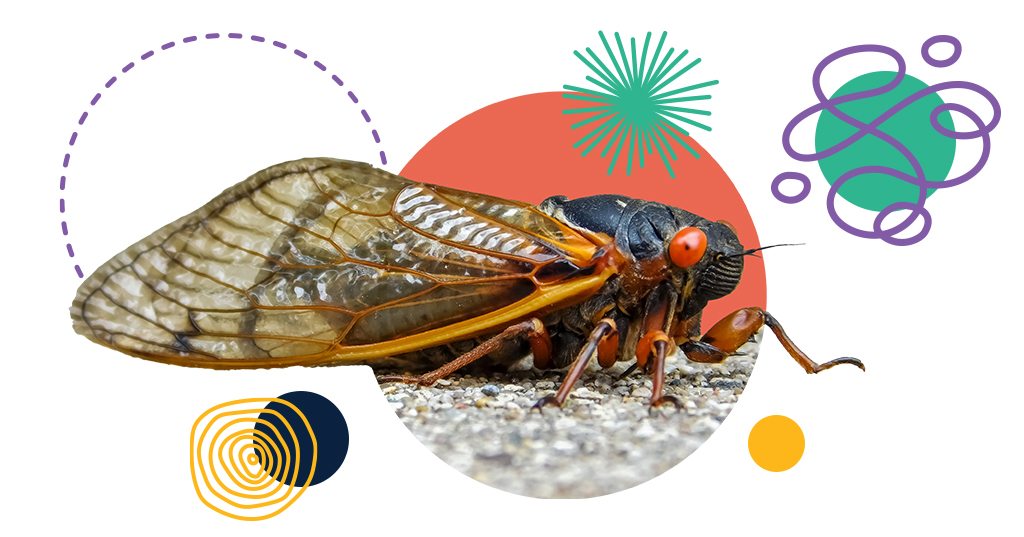 By Gwen Roth, Hamilton County Soil and Water Conservation District, and Jennifer Korn, Pleasant Ridge Branch Manager
By Gwen Roth, Hamilton County Soil and Water Conservation District, and Jennifer Korn, Pleasant Ridge Branch Manager
The cicadas are here! By now, you probably know that the Brood X periodical cicadas are emerging in our region during May. These cicadas burrowed underground as nymphs in 2004. The now-adult cicadas emerge for the final few weeks of their life to reproduce, creating the nymphs that are emerging in 2038.
While it is impossible to know the exact number of cicadas emerging, they have been as dense as 1.6 million per acre which equals a lot of cicadas. Cicadas are loud, large, and having one fly at your head is a bit scary, but they are harmless to people and are ecologically beneficial. These are just a few of the interesting facts about periodical cicadas. Learn more at CicadaSafari.org, opens a new window.
- Brood X periodical cicadas begin to emerge when the soil temperature reaches 64 degrees Fahrenheit.
- Only male cicadas "sing.” Using a body part called a tymbal they make a sound to attract females for mating.
- Pesticides are not effective in killing cicadas. In fact, cicadas provide many benefits to our local ecology, including pruning trees (leading to increased fruit in future years), disturbing the soil allowing for more air and water flow, and even adding nutrients to the soil after dying.
- Cicadas do not bite or sting, but they can cause damage to young trees. If you have a young tree, loosely wrap it with cheesecloth or netting to prevent the female from laying her eggs.
Free Crash Course in Periodical Cicadas
Love them or hate them, there’s no denying periodical cicadas are fascinating insects. Learn all about the biology, history, and impact of Brood X by watching our free presentation by Dr. Gene Kritsky from Mount St. Joseph University. Dr. Kritsky is one of the world’s leading experts on periodical cicadas as well as an engaging teacher. Although the program has already taken place, you can watch a recording of the presentation below:
You can also help with Dr. Kritsky’s periodical cicada research and track the Brood X emergence with the free Cicada Safari app.
Cicada Fun for Families and Kids
Many of CHPL’s branch locations are hosting cicada programs for all ages. Visit the Covedale or Pleasant Ridge branches in May to participate in a cicada scavenger hunt. Attend the Covedale Branch’s Cicada Celebration & Discover Summer Kick-Off Event. Check the Library’s program calendar for more fun.
If you cannot make it to a branch, don’t worry! These activities are doable anywhere:
- Learn more about cicadas through this virtual storytime and a craft with Gwen Roth, the Education Specialist from Hamilton County Soil and Water Conservation District.
- Observing cicadas at a park or in your yard makes for an easy and free science activity. Brood X consists of three different species and it’s easy to identify the species just by looking. Examine cicada burrows with some plaster of Paris, a garden trowel, and a few days of dry weather.
- Did you work up an appetite while hunting for cicada shells and picking them out of your hair? Make a tasty cicada-shaped snack using foods you already have at home
- Wear your appreciation of cicadas with a cicada pin made from a clothespin and chenille stems.
Further Reading
Explore even further through these selected library books and articles.
For Kids and Families
- Cicada Summer by Andrea Beaty
- Ada the Very Loud Cicada by Henry Dillard
- Cicadas by Christina Leaf
- A Periodical Cicada’s Life by Ellen Lawrence
- Cicadas Strange and Wonderful by LaurencePringle
For Teens and Adults:
- National Geographic Backyard Guide to Insects and Spiders by Arthur Evans
- In Ohio’s Backyard: Periodical Cicadas by Gene Kritsky
- Insect Mythology by Gene Kritsky
- Cicada by Shaun Tan
- “The 1911 Invasion of Insect Armies.” A scanned newspaper article from The Miami Gazette, 1911.



Add a comment to: Celebrate Cicadas with Buzzworthy Programs at the Library